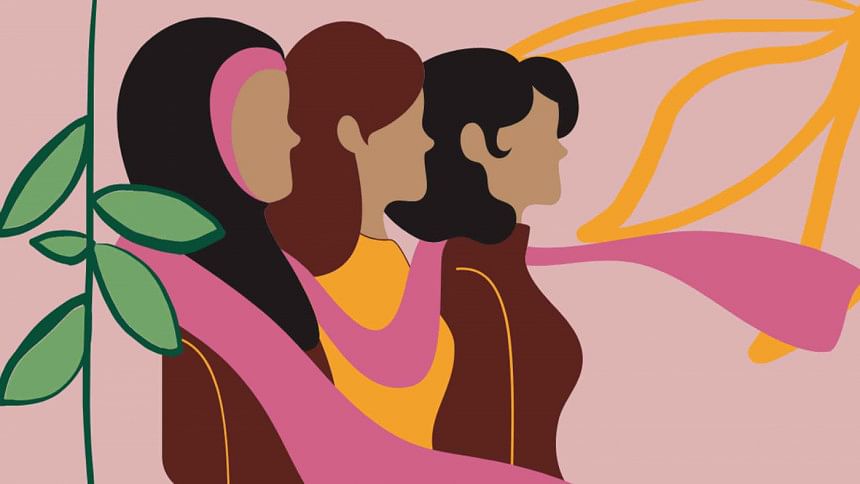Time to focus on women’s sexual health and rights

Bangladesh has made significant progress in the last two decades in improving the lives of women and girls. Maternal mortality rates are decreasing, fertility rates are decreasing, and gender parity in school enrollment is increasing. Women's participation in the labour force is 34.5 percent which is the third-highest among South Asian countries. Bangladesh is ranked 65th globally and first in South Asia in terms of Gender Gap Index 2021, with a score of 0.719. Although Bangladesh performs extraordinarily well in the political empowerment dimension of this index, there are still significant gender disparities in several dimensions.
Bangladeshi women and girls confront challenges in every aspect of their lives, including access to healthcare, economic opportunities, political engagement, financial access, and decision-making ability. Sexual and Reproductive Health and Rights (SRHR) is a set of essential human rights that women are often deprived of. This includes the right to life, right to be free from torture, right to health, right to privacy, right to education, and the prohibition of discrimination. The key issues of SRHR for women in Bangladesh include child marriages, adolescent fertility, unintended pregnancies, and gender-based violence.
According to the Violence Against Women (VAW) Survey of 2015, almost two-thirds of ever-married women have encountered one or more types of domestic violence—physical, sexual, economic, emotional acts of violence, and controlling behavior—from their husband at least once in their lifetime. More than a quarter of the women also experienced physical violence from someone other than their husband (non-partner), while adolescents experienced the greatest rates of non-partner physical violence, at 30.9 percent, in their lifetime. Adolescent girls do not receive proper knowledge on their sexual rights, which makes them prone to violence. The importance of sexual education is undeniable at this stage of life, regardless of gender.
Child marriage is a violation of SRHR as it seizes a young adolescent's physical and psychological freedom. Bangladesh has the highest rate of child marriage in South Asia and is also among the top ten countries in the world. Around 51 percent of young girls and women were married before their 18th birthday. It is not easy to reduce this rate because it is supported by national law. Although The Child Marriage Restraint Act 2017 sets the minimum legal age of marriage for women at 18, it can be lowered to 16 through the Child Marriage Rule under "special circumstances," which includes cases when a girl elopes with a man and refuses to return, or becomes pregnant before marriage. There are 38 million married girls under the age of 18 in the country, with 13 million married before the age of 15. Ending child marriage by 2030, as set out in the Sustainable Development Goals (SDG), will necessitate a massive push.
The latest Bangladesh Demographic and Health Survey reported that 36.2 percent of women aged 15–49 years cannot make their own informed decisions regarding sexual relations, contraceptive use, and reproductive healthcare. This is reflected in the fact that the adolescent birth rate has increased from 75 in 2015 to 83 in 2019, per 1,000 women, according to BBS. Contraceptive prevalence rate is 62 percent in Bangladesh, with 52 percent women using any modern methods of contraception. Only seven percent of men use condoms for birth control. The moderately unsafe birth control pill is the most widely used contraceptive method, and most family planning methods are meant for use by women. This burden is not helped by the fact that women often lack access to a variety of contraceptive methods. This is not in line with the CEDAW, which says to eliminate discrimination against women in healthcare, including family planning methods, of which Bangladesh is a signatory.
A single comprehensive policy or strategy for ensuring SRHR is absent in Bangladesh. However, various laws and strategies address several components of SRHR in a fragmented manner. The Adolescent Reproductive Health Strategy empowers women and adolescents via decision-making skills and sexuality education in the school curriculum. Some other laws, such as the Dowry Prohibition Act 1980, Acid Crime Prevention Act 2002, and Acid Control Act 2002, work together to prohibit violence against women. However, these laws are dated and might not be able to meet all the needs of women in the country's present context.
Proper implementation of laws is also a major challenge for ensuring SRHR for women. Although the Child Marriage Restraint Act 2017 necessitates the production of legal documents like birth certificate, national identity (NID) card, SSC/JSC/Primary certificate, or passport to prove the bride's age, it cannot stop a child marriage as documents can be falsified and illegal marriage (without registration) may also occur.
Because of patriarchal conceptions of women's duties within the family, women are frequently valued based on their capacity to reproduce. Ensuring sexual and reproductive health and rights is a daunting task in Bangladesh where open discussion on sexual health is a taboo. Thus, a context-specific awareness programme is needed, that can foster positive sexual and reproductive health practices and address norms leading to negative outcomes.
Farhin Islam is a research associate at the South Asian Network on Economic Modeling (Sanem). Email: [email protected]

 For all latest news, follow The Daily Star's Google News channel.
For all latest news, follow The Daily Star's Google News channel. 



Comments